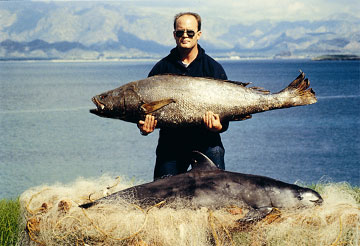U.S., Mexico, Canada pledge to save the vaquita from extinction
mongabay.com
October 30, 2008
Last stand for the world’s smallest and rarest porpoise
|
|
The United States, Mexico, and Canada will work together to conserve the vaquita, the world's smallest, and most endangered, species of cetacean.
The governments will fund research and work with fishermen in the upper Gulf of California to eliminate the use of fine-mesh gill nets and other fishing practices that threaten the species, which is estimated to number around 150 individuals. A U.S. vessel is already laying out a network of acoustic monitoring devices to track the porpoise in the Gulf.
The North American Conservation Action Plan (NACAP) for the Vaquita (Phocoena sinus) also seeks to develop alternative livelihoods for fishermen affected by the conservation efforts. The initiative is headed up by the North American Commission for Environmental Cooperation.
 Though protected, totoaba (above), as well as the small porpoise known as the vaquita (below), fall prey to fishing nets in the Gulf of California — just another factor stifling the recovery of both species. (Credit: Omar Vidal) |
"The objective of the recovery efforts is for people who make their living from fishing to see the vaquita as an opportunity for economic and social well-being, and not a threat to their future," said Adrián Vázquez-Gálvez, executive director of the CEC. "In the end, only with the support of Upper Gulf communities can we achieve vaquita recovery and the conservation of the region's marine resources as a whole."
Scientists estimate that without urgent measures, the number of vaquita could fall below the minimum viable population of 50 adults within 2 years.
Related articles
The extinction of the baiji a ‘wake-up call’ to conserve vaquita and other cetaceans
(8/25/2008) In December of 2006 an expedition spent six weeks surveying the Yangtze River in China for one of the world’s rarest cetaceans, the baiji. Also known as ‘The Goddess of the Yangtze’ the shy river-dolphin had roamed the river for millions of years locating fish with echolocation. The survey came back empty-handed without a spotting a single dolphin. Dr. Jay Barlow, a member of the surveying team, described his emotions on the expedition’s findings in an interview with Mongabay.com: “I was stunned. I knew the species was in trouble, but I did not think they were already gone. We really had not seen the extinction of a large mammal species in 50 years, so we grew complacent.”
Only 150 vaquita remain
(11/19/2007) Only 150 individual vaquita, the world’s smallest cetacean, remain, according to a new study published in conservation Biology. The species has been decimated as accidental bycatch in fishing nets in its Gulf of California habitat. Researchers–who say there may be only a two-year window to save the species from extinction–have launched a last-ditch conservation effort.